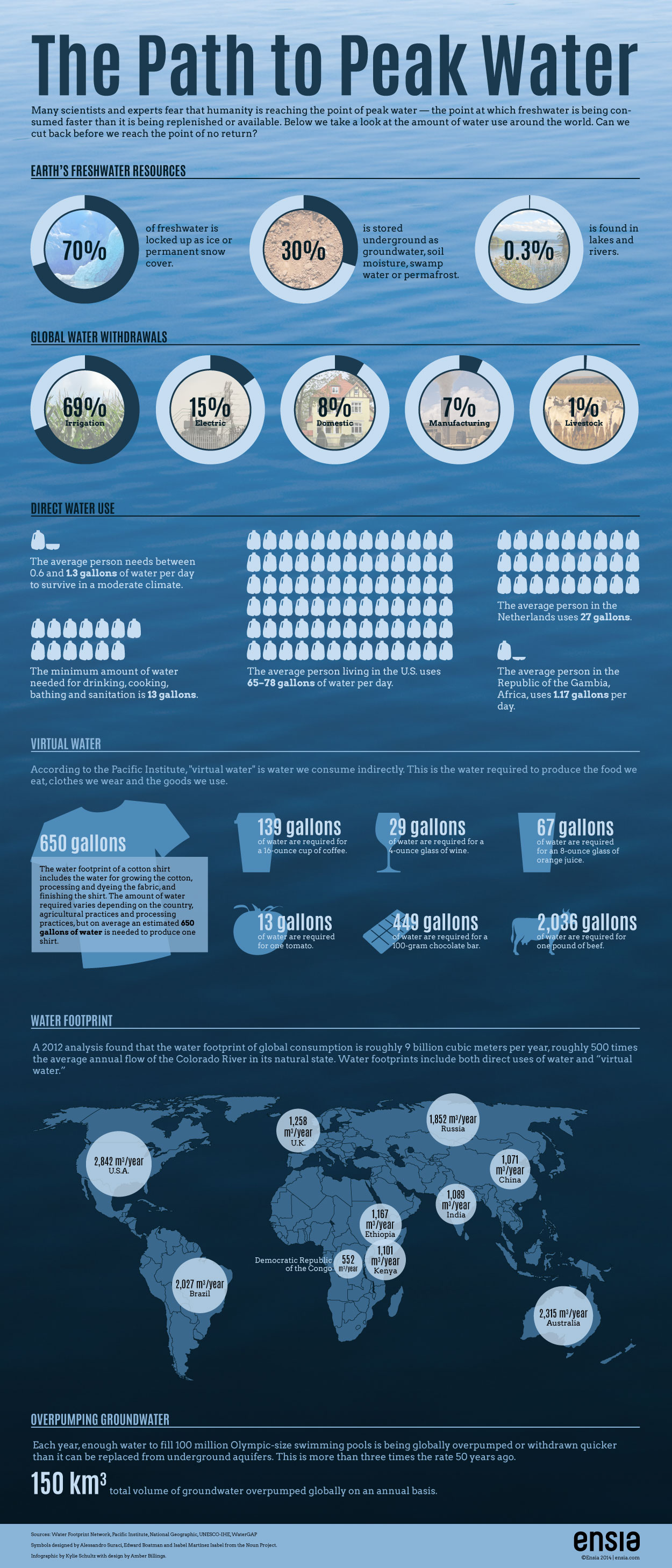Page added on May 31, 2014
The Path To Peak Water

Water is the lifeblood of humanity; it turns out it is in short supply. Like any other commodity high in demand, you should keep an eye on it for investment purposes as we get closer and closer to “peak water.”
The overwhelming majority of global fresh water is locked up as ice or permanent snow cover, making it inaccessible and severely limiting our readily available supply. The average American uses 65 to 78 gallons of water per day, while the average person in the Republic of Gambia, Africa, uses just 1.17 gallons, barely above the minimum amount needed to survive.
Not only do we consume a lot of water per day, we also use huge amounts of “virtual water.” Virtual water is defined as water we consume indirectly from goods we use, food we eat, etc. Look down at your shirt, did you know that it took 650 gallons of water to make it? If you love beef, we have some bad news for you. It takes 2,036 gallons of water to produce just one pound of beef!
With all that said, there are major investment opportunities in the water supply industry. Our friends at Sprott Global have outlined three distinct areas that water investors should consider: adaption to water systems to handle changing weather patterns, improving water safety and managing storm water in urban areas. There is a need of investment in infrastructure to the tune of $45 billion in New Jersey alone over the next 20 years. Check out the article they posted that further details investment opportunities by clicking here. You should definitely keep an eye on this clear liquid gold.
9 Comments on "The Path To Peak Water"



dubya on Sat, 31st May 2014 10:19 am
Frankly, what the hell does “USES” mean, anyway? Americans use 75 gallons a day but a coffee uses 139 gallons? That doesn’t even make sense, unless the 1 coffee a day consumers are a lot rarer than in my neighbourhood. Does that 139 gallons disappear off the earth, or does it – like most of the water on earth for the past 5 billion years – just get used again? I have a hard time drinking a gallon a day, so I presume you are counting flushing toilets and washing automobiles, but not the 2000 gallons in 4 hamburgers.
If I catch the first cold liter from my shower, drink it then water my plants with the urine did I use 3 liters or just one? Well, I hate to point out that every one of your “USED” gallons did something like that.
More useful might be how much money energy and infrastructure is spent raising water to a pristine drinking standard then watering a lawn or shitting into it, then trying to get the shit out so the next city downstream can do the same thing.
This is a hodgepodge of useless statistics. But think of the investment opportunities!
bobinget on Sat, 31st May 2014 11:02 am
Comparatively….
Few agricultural situations in the world have access to
irrigation. Agreed?
Coffee second only to petroleum in trading volume*, is almost all, rainwater irrigated. If no crop were planted rain water would simply go about its paths
passing through other vegetation.
Once irrigation enters the picture we have global market forces entering an equation.
Investment firms, (hedge funds) are buying up water rights for unheard of sums**.
* http://www.investorguide.com/article/11836/what-are-the-most-commonly-traded-commodities-igu/
** http://en.wikipedia.org/wiki/Water_trading
bobinget on Sat, 31st May 2014 11:26 am
Scarcity, water or oil increases value locally.
Irrigation rights in the Western US have always been highly valued. 30 years ago in my neighborhood historic rights were selling for about 900 per acre.
Today, $10,000 will buy you a single acre (foot deep).
We are slowly adapting to climate change without actually BELIEVING in reasons why too much precipitation falls in one region and insufficient in others. It really does not matter what people believe or not believe about climate change. That horse left the stable 30 years ago. Excess precipitation, drought,
is becoming a way of life. We will adapt without ever coming to agreements as to causes.
Out of dire need, pipelines will be laid, recycling of waste, saline, water will go forward. Does anyone here
believe the Saudis endorse climate change science?
Nevertheless, KSA, because it used all of its ‘old’
water is busy converting all of its oil powered desalinization to gas and solar. Much will be learned.
If you want to keep up with water happenings:
http://www.waterworld.com/news.html
There is no such thing as “peak water”.
Unlike oil, every drop of water is still with us somewhere on the planet. The only trick is fair distribution.
Davy, Hermann, MO on Sat, 31st May 2014 11:54 am
Bob said – There is no such thing as “peak water”.
Unlike oil, every drop of water is still with us somewhere on the planet. The only trick is fair distribution.
Exactly Bob should be Peak Fresh, clean, non-toxic Water
bobinget on Sat, 31st May 2014 2:08 pm
I believe both Davy and Hermann might agree, we need to look harder at the how and why fresh and increasingly salt water is being contaminated.
It would be cheaper to stop polluting than removal of offensive chemicals and organic matter. That all goes under the heading of ‘water treatment’.
Can we stop 150 million peeing antibiotics, estrogen, progestin, and countless other medications?
With 40% of our electricity powered by coal, can we stop sulfur, mercury and other trace metals from entering the food chain?
Yes, indeed we could, if we had to.
There are substitutes for oral birth control pills.
Keep antibiotics out of animal feed.
Stop coal burning and we ease the biggest problem facing clean water (and air) today.
Missed articulating that point, so obsessed with filtration, I am.
J-Gav on Sat, 31st May 2014 6:09 pm
What definitely needs to be avoided to have any chance of a ‘water future’ is the privatization of the entire sector presently planned by TPTB. Otherwise, it will become just one more wedge in the toll-booth society meant to ensure that ‘the people’ become and remain the slaves of our financial masters.
bobinget on Sat, 31st May 2014 6:43 pm
J-Galv, IMO it will be once again: “The Means of (water) Production” that’s privatized.
New, hyper thin and strong materials like ‘grapheme’
membranes making water purification far less energy energy intensive. The biggest game changer in Water World of Reverse Osmosis.
“The principal competing processes use membranes to desalinate, principally applying reverse osmosis technology. Membrane processes use semipermeable membranes and pressure to separate salts from water. Reverse osmosis plant membrane systems typically use less energy than thermal distillation, which has led to a reduction in overall desalination costs over the past decade”.
Israel tackles salty water:
http://abcnews.go.com/Technology/wireStory/israel-solves-water-woes-desalination-23923342
If you have not already checked Wikipedia;
http://en.wikipedia.org/wiki/Desalination
Makati1 on Sat, 31st May 2014 8:05 pm
Yes, the quantity of water is static, but the location and type of water are not. With the melting of the glaciers, Arctic ice, Antarctic ice, Greenland ice, etc, more fresh water is becoming salt water until the next ice age. As the climate changes, the rainfall patterns will also change. What good is 6 inches of water if it falls all at one time in a big storm and runs off of a drought parched farm? Ask any farmer how important timing is for his crops.
How will you desalinize enough water if there are no hydrocarbons available? Solar power? Hahahahahaha. Not in this lifetime. No, when we run out of oil/NG/coal, we will also run out of enough water. Maybe before. Just another way we will be eliminated by Mother Nature.
Meld on Sun, 1st Jun 2014 2:08 am
At lest the UK will have a booming rain water sales business in the future. It seems we get most of the water everyone else throws away